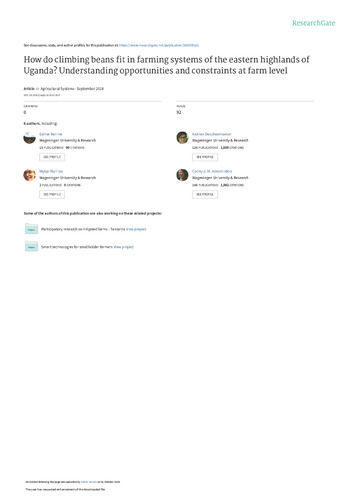How do climbing beans fit in farming systems of the eastern highlands of Uganda? Understanding opportunities and constraints at farm level
Abstract
Climbing beans offer potential for sustainable intensification in the East-African highlands, but their introduction requires a major change in the cropping system compared with the commonly grown bush bean. We explored farm-level opportunities, constraints and trade-offs for climbing bean cultivation in the eastern highlands of Uganda. We established current food self-sufficiency, income, investment costs and labour, and assessed the ex-ante, farm-level impact of four climbing bean options on these indicators. Input for this assessment were a detailed characterization of 16 farms of four types, and on-farm, experimental data of adaptation trials of climbing bean. Climbing beans generally improved food self-sufficiency and income, but often required increased financial investment and always demanded more labour than current farm configurations. Opportunities for integration of climbing beans on small farms were limited. Although some of the poorest farmers accrued the largest absolute benefits from climbing beans, their ability to make the necessary investments is questionable. The analysis was translated into a simple-to-use modelling tool to enable participatory analysis of the outcomes with farmers of the four farm types to understand their perspectives and decision-making. The discussions revealed a recent increase in market prices for climbing bean resulting in growing interest in their cultivation in the eastern highlands. A lack of seed and stakes was limiting climbing bean cultivation, and a sufficient amount of climbing bean seed needs to be ensured through strengthening of farmer cooperatives and improved storage.

